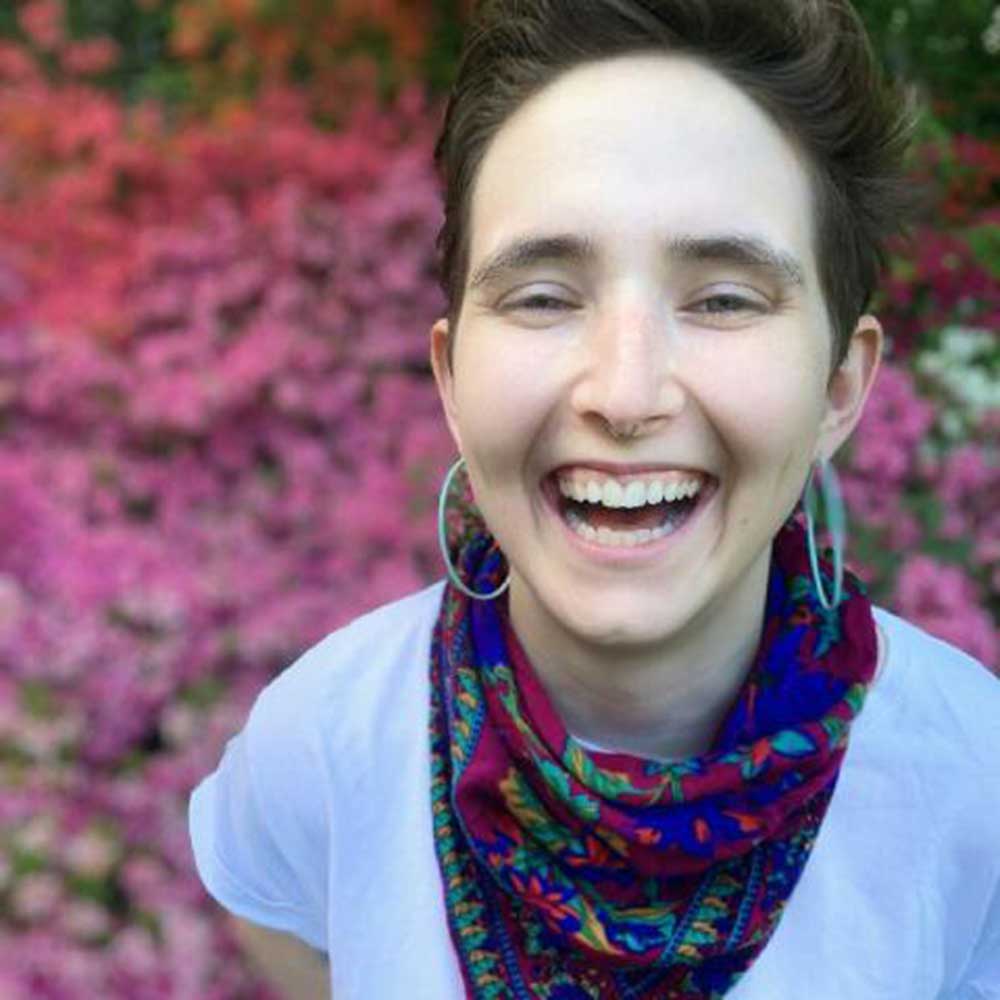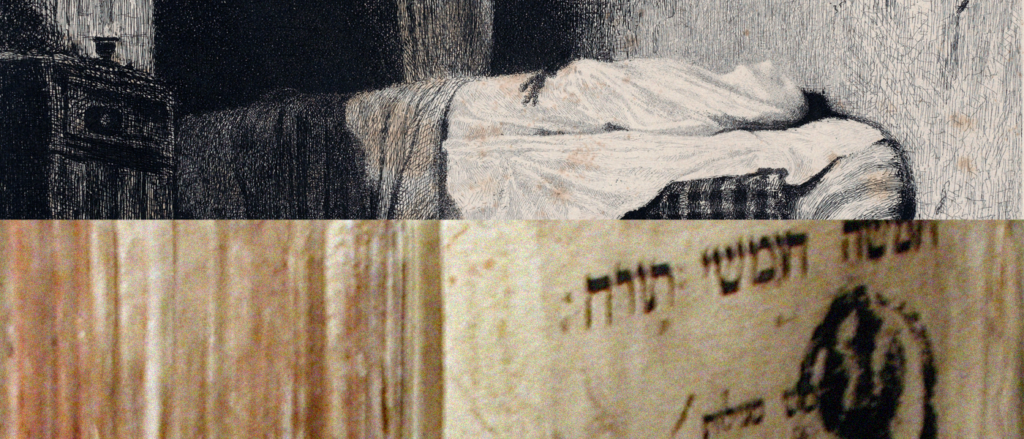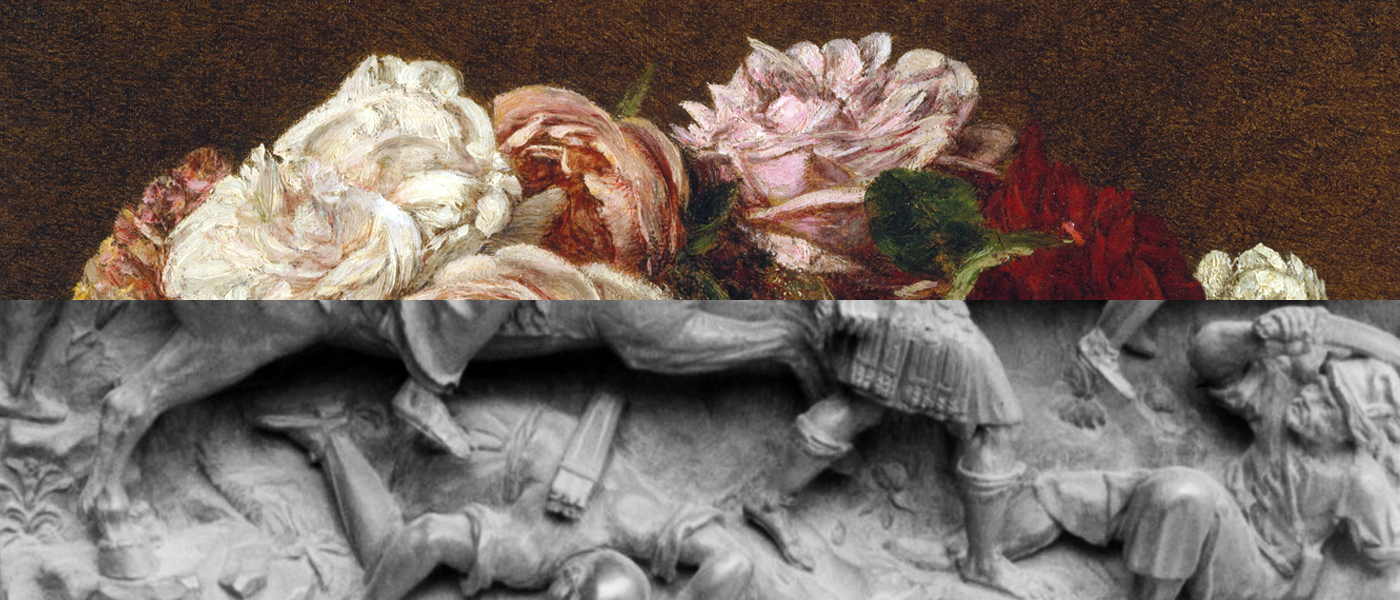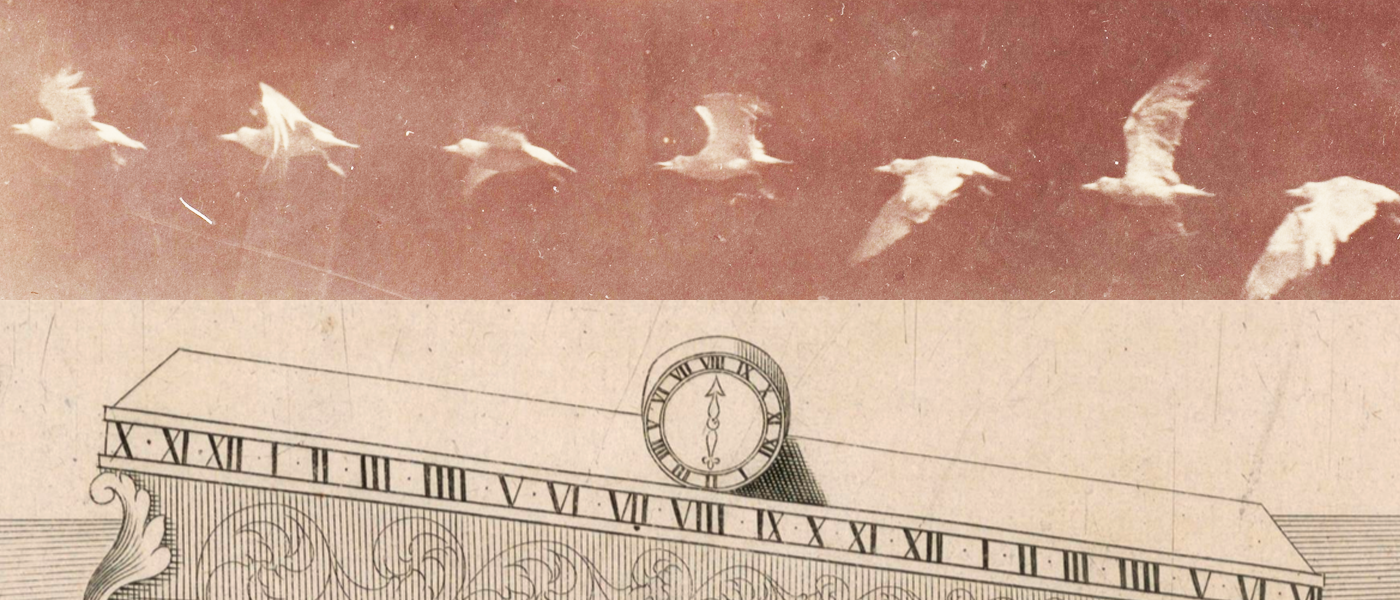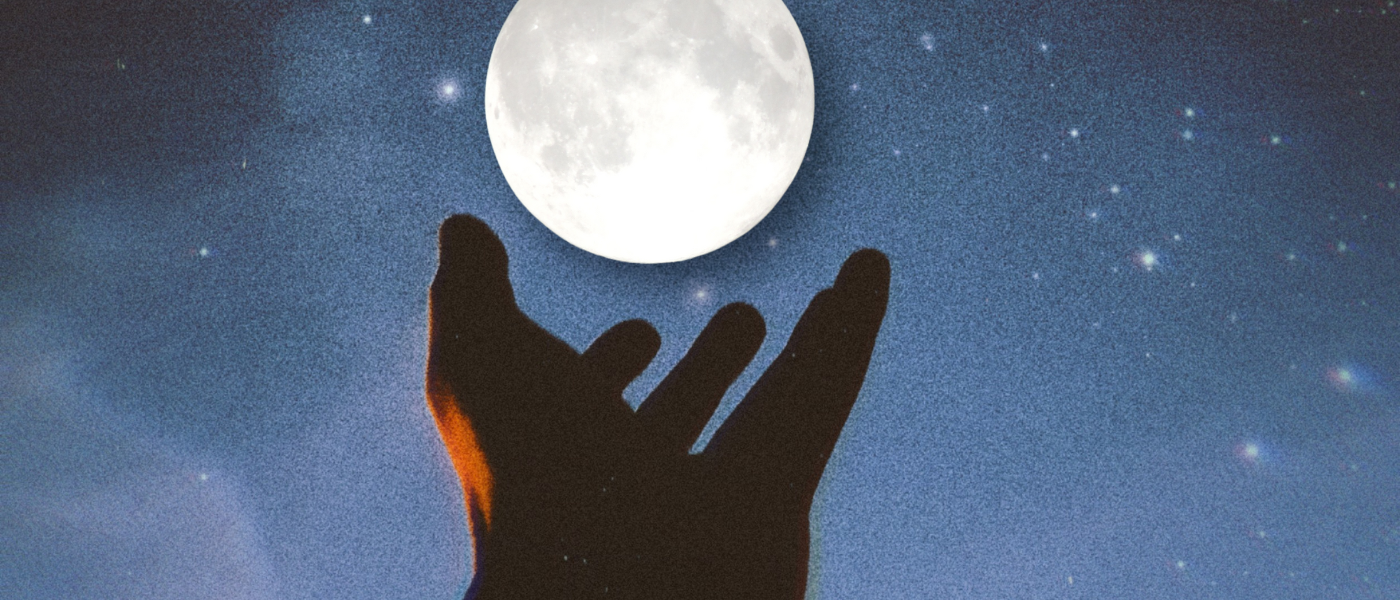I had thought I was alone. A familiar scent of bleach and black coffee hung suspended in the warm air of my childhood kitchen. I remember looking down at my five-year-old knees, constellated with scabs that shone in the afternoon light streaming in through the window above the sink. And then, abruptly, a voice rumbled out of an unidentified black box on the countertop: Greetings, you’ve reached… I stood frozen, mesmerized by the crackling tones that I soon recognized as my father’s voice, impossibly parroted back by this machine. Goosebumps stippled my forearms. My father’s disembodied voice uttered a name I did not recognize. The voice rang out into the empty kitchen as I realized: my dad had a name other than “dad,” and somehow the sound of his voice had been caged inside this box only to leak back out later. How unbelievable that I could surrender to this conclusion, that a body-less voice could ever become mundane, that I could learn to take for granted this ‘answering machine.’
Twenty five years later, my initial bewilderment over hearing my father’s recorded voice reveals itself anew, arising with heightened potency. Lying alone in bed, I watch videos of my dad late into the night, his voice filling the small space between my straining eyes and the too-bright screen. He died two months ago. These recordings stun me, unmoor me, but I watch and re-watch. Some of them are just thirty second clips of him sleeping in the final weeks of his life. I close my eyes and listen. Automatically, my body mimics his breathing. I sync my inhales with the sound of his inhales, stitch my exhales to his, until the recording ends. How is this possible? How have I trapped his breath here, even though its source has been extinguished. How dare my body still be so easily fooled by sound.
In Hebrew, one of the names of G-d, יהוה, is unpronounceable on purpose. It is voweled in such a way that it reminds the reader not to say it aloud, to protect the name’s sacredness by not uttering it. It is common in the text and is translated as The LORD, or even The Name. As a nascent translator of ancient Hebrew, I am often so focused on sounding my way through a new text that I stumble upon this word and try to say it aloud. Though I’ve known the word since I was a child, I somehow forget it most often of all, and conduct my own ritual upon it: tongue desperately straining against its vowels, the ones designated to defend against its sonic incarnation. When I realize I’ve made this same mistake again, I smile, sigh, and look anew at the letters, their familiarity suddenly stark on the page. The Name got me again, put me right in my place: murmuring, searching, yearning for syllables to string together, and speak aloud.
I don’t recognize the tunes at that shul! my dad shouted, jovially complaining to my sister and me. He only joined us at temple on Yom Kippur but stood firm in his insistence that we attend Hebrew school and Shabbat services.
Why not? we whined in reply, from our shared perch on the couch. I was probably nine years old, and my sister, two years younger, about seven. We kicked our legs wildly, our knees knocking together like a chorus of bony bells as we persisted in our protest. Why should we have to go then? Why does it matter? My dad was quiet. My mom sat beside us on the couch, chuckling and observing the debate.
It matters, he started slowly, Because it’s one way to be connected. I blew out a bored breath so strong that it lifted my bangs out of my eyes as I stared at him.
Connected to what? my sister demanded.
What are you connected to then? I piled on.
He smiled and began pinching our cheeks and shoulders. Live music is my religion, ok? We exploded into giggles, tickled and satisfied despite our failed interrogation. Once again, my mom was taking us to services and he was going to a show. That was how religious observance went in my household.
As I got older, I came to understand that my dad grew up in a Conservative synagogue, and the Reform one we’d joined at the behest of my mom’s mom never resonated for him. He didn’t recognize the sounds. It wasn’t that the rituals didn’t matter to him; they did, deeply so. My dad’s Judaism was not enacted through service attendance, but it was core to him. He often made impromptu speeches in the kitchen about the one-ness of all things, passionately impressing upon my sister and me that this was the key truth of our ancestral practices. This was how he boiled down Judaism’s monotheism: interconnectedness.
The way he accessed that interdependent sacredness was through live music. During his kitchen counter keynotes, he vacillated between pure earnestness and raucous jesting about concert stages as his temple, chord progressions as his Torah chants. He joked, I think, to deflate the seriousness of it, making the lofty idea of “connection with the divine” simultaneously more ordinary and more precious. The connection he described was mostly unsayable, but it belonged to me and to anyone who leaned in and listened for it. My dad believed this was the feeling to which Jews gave the unpronounceable nickname. Jews often write it in English as “G-d,” with the dash replacing the middle letter.
In my adulthood, I’ve reclaimed Jewish practice on my own terms, committing myself to text study and learning more Hebrew than anyone in my family has in probably three or more generations. Through ancient translation work, I’ve come to believe that the gap in the word “G-d” preserves the sanctity of the unnamable Name—like the vowels do in Hebrew—but also leaves a space for the reader to enter, invites whoever utters the name to insert themselves into its oneness.
During a Saturday morning service, readers chant from the Torah and then lift it up above the entire congregation before returning it to its home in the Aron Kodesh. Everyone in the synagogue looks at it, collectively witnessing the weight of this book, held up as two hefty scrolls. Its importance is physicalized by the holder’s real struggle to bring it into the air on their own, to briefly suspend all of its stories and sounds above the covered heads of its readers. It’s a small moment, but an important one.
In some congregations, the ritual is accompanied by the chanting of a Hebrew phrase, excerpted from Deuteronomy and Numbers, that can be translated as, “This is the Torah that Moses set before the people Israel—by the mouth of G-d, through the hand of Moses.” Congregants even point at the Torah as they say it, as if to emphasize, There it is—that’s the book G-d wrote! This always strikes me as such tender honoring of text, or more specifically, of supposedly spoken language that was heard, written down on parchment, and passed on from generation to generation. This book is heavy with sound, represented on the page by a deluge of Hebrew consonants that are sung aloud each week.
Even during my unenthusiastic attendance at Shabbat services as a child, this strange ritual always struck me. We gather together each week to read aloud a bit more of the same story that we read last year, and the year before, and the year before that. In adulthood, my awe remains for all these Torah rituals, perhaps rooted in utter disbelief.
As a community member grips the handles of our synagogue’s Torah and hoists it into the air, I wonder about how much trust we’ve placed in Moses, to have gotten all of it down, after G-d hurriedly whispered it into his ear at Mount Sinai. We perform these rituals of worship over the Torah, repeating to ourselves that it’s a direct quote from G-d, saying out loud that divine utterance is what we trust most. When the hushed wonder falls over the crowd, we all lift our fingers in the direction of the Torah.
With arms outstretched, we are reaching across thousands of years and thousands of miles, towards those ancient letters reinscribed carefully onto new scrolls. I believe what we are really beholding in that moment, what we are turning our living bodies towards, is the embodiment of our distant ancestor. That’s what we trust most. After the chant, it’s silent. Fingertips in the air: we are all pointing at Moses’ ear.
Since he was young, my dad dedicated himself to recording the concerts he attended. For him, the feeling nicknamed “G-d” traveled through sound: the twang of steel strings, the crisp beam of a high note coursing through a soundboard. My childhood was marked by the different eras of his evolving recording practice: he learned more, the technology developed, he could afford better equipment, he got in with all the sound guys in town who granted him access to plugging into the board. Once we were old enough, he enlisted us to help him carry his bags to the car and, at occasional under-21 shows, to help guard him in the crowd. Honoring the sanctity of live music and chasing the perfect recording, my dad detested show talkers. He always came home griping about annoying drunks slurring questions about his mic or about stoners singing the chorus way too loud. When my sister or I attended a show with him it was to help flank his gear, to protect the sound quality, to let the experience stream straight into the mic’s receptors and preserve it as closely to the original as possible.
My dad would replay his most recent recordings late into the night, at full volume, from his mysterious lair in our half-finished basement. The music floated through the vents and spilled into the bedroom I shared with my sister, wafting all the way to my top bunk. His nightly ritual facilitated my own: I’d lay flat on my back and listen, humming along to the choruses I’d come to memorize. Between songs, when the audience clapped and stomped, the floorboards quivered. My chest thrummed from the shudders of sound. The volume felt both immediate, as it reverberated through every part of me, and faraway, muddled and lulling by the time it reached my ears. I’d fall asleep, occasionally stirred by a shrill holler from the recorded crowd or, after the show finally ended, a faraway train whistle crooning as it sped out of the station and into the night.
“Archaeoacoustic scientists have recently discovered a way to play minute scratches in ancient pottery, much like vinyl records,” reads the byline of a now thoroughly disproven hoax, accompanied by a falsified video where Belgian archaeologists supposedly “discuss how they were able to use computer scans of the grooves in 6,500-year-old pottery to extract sounds—including talking and laughter—made by the vibrations of the tools used to make the pottery.” The deep disappointment I felt, upon learning this was untrue, is embarrassing. But I’m grateful for the longing it revealed in me, a longing for impossible sound, achieved through what can also be held in the hand.
When I began to translate ancient Hebrew poetry, slogging through dizzying leaps in syntax that I struggled to sew together—or to let fly apart with purpose—I found an unlikely guide in the poet Robert Frost. In a letter to Sidney Cox, he wrote, “Words exist in the mouth not in books. You can’t fix them and you don’t want to fix them.” In his letters, Frost articulated an important part of his poetics, what he termed the “sound of sense.” He argued that poetry should contain sentence-sounds that echoed everyday speech, recommending “the best place to get the abstract sound of sense is from voices behind a door that cuts off the words.” Frost believed one could overhear the sound of sense, when not distracted by the sense itself. He believed that syntax contained the “living part of a poem,” and that syntax could only be felt by those who have heard that language “in conversation.”
Mr. Frost, I think of you every time I tackle a new section of Psalms or Proverbs. I am guilty of trying to bring breath back into ancient poems, in a language that has not been spoken in conversation in nearly 2,000 years. Without what you called “the most volatile and at the same time important part of poetry,” I attempt—despite the fact that you believe that once a language’s everyday speech has gone extinct “the language becomes a dead language, the poetry dead poetry.”
Even with the help of the Masoretes, a group of 5th-10th century Jewish scribe-scholars who attempted to standardize and preserve the pronunciation of Hebrew texts, I know my task is destined for failure in so many of the ways that matter. But I still refuse to give up. I will try to reanimate sounds across a gap, to vocalize from and towards a darkness. I will teach my living body how to hear, and to feel, the poetry of the dead.
In the month leading up to my dad’s death, my sister and I temporarily moved in to help our mother care for him. We took turns delivering his narcotics, washing the oxygen tubes, teaching ourselves to use the blood pressure monitor and pulse oximeter. My entire body became tuned to the sound of his voice, waiting anxiously in case he called for help. From down the hall, even when asleep, I would shoot straight up if I thought I heard him. His voice somehow started sprouting from everywhere: the heating vent, the cat’s scratch, the toilet flush. Each sound became a mockingbird practicing the pitch of his gruff pleas for ice, for painkillers. The house was a chorus of his need.
One night, he fell asleep just before the movie ended, my sister and I sitting on the floor beside his mattress. I clicked the TV off and tip-toed out of the bedroom. After a few minutes, he stirred awake, and I heard him call out into the night, “Where did Shelby go? Shelby?” I peered towards his room. It was so dark that I could not tell if the door was open or closed.
Early in the Book of Genesis, Adam and Eve eat from the tree of knowledge and realize they are naked. Most translations describe how, after covering their shame and hiding in the trees, “Adam and Eve hear the sound of G-d moving around in the garden at the breezy time of day.” The Hebrew word for sound, קוֹל (kol), can also be translated as noise, voice, or the sound of an instrument. G-d’s sonically ambiguous movements occur during “the breezy time of day.” The root word for “breezy” is רוּחַ (ruach) which, in addition to meaning “wind,” can also mean: mind, breath, spirit, and often carries connotations of life force and sacredness.
The resulting scene is textured by air and movement, animated from all angles by the music of G-d’s breath, and these murmurs move through the trees beneath which Adam and Eve crouch. Every sound they hear is suddenly charged with G-d’s spirit, and it scares them. The words here invoke the English word, “psithurism,” meaning, “the sound of rustling leaves or wind in the trees.” “Psithurism,” though archaic, slithers through the teeth much like the wind shimmers through the trees. Likewise, רוּחַ (ruach) stages a forceful breeze in the throat of its speaker with the strong, guttural “ach” it ends upon.
For some people, sound is what language travels inside. Sound is one way meaning can be perceived by a body, as it uncorks the definitions of words and the structures of sentences. But sometimes the sounds themselves import meaning, perhaps speaking directly to the body through the vibrations of tone, pronunciation, alliteration, rhythm, and onomatopoeia. In language, all possible human senses collide and transmute in infinite ways. For some, sight (via reading) can become sound (via speech) which can become touch (via breath.) Language involves the entire body.
When I translate, I search for approximations of the text’s original sounds. I reach towards how the words might have rung in the mouth of an ancient reader, and mostly fail. A kind of music is inevitably lost, or perhaps the music is being protected, concealed inside the culture, history, and geography from which it emerged.
After Adam and Eve hide, G-d calls out loudly, “Where are you?” The question must have hung in the air for a moment before Adam admits, “I heard the sound of you and I hid.” The root word for “heard” is שָׁמַע (shama) and it can also mean: listen, obey, give consent to, summon. It is the word that begins Judaism’s central prayer, the Shema, which commands the Jewish people to heed the one-ness of G-d, and of all things. Simply by hearing G-d, Adam and Eve perceive interconnectedness and understand their part in something larger. Even in hiding, they are touched by the vibration of spirit as it howls through the leaves onto their still-bare knees.
In the final days of his dying, of his living, my father spent long hours restless, moaning and hallucinating. He had insomnia, and in spite of his shaky legs, he kept trying to leave his bed. All night long, up and down, walking towards the door. My sister and I sat on the ground beside him and kept watch as best we could, gently dissuading him from standing. When he cried out in pain, we cooed, while slowly squeezing liquid haldol and methadone into his mouth through oral syringes.
During all those long hours spent sitting on the carpet guarding my dad, I dissociated on my phone—swiping through the mundane joys of faraway friends—but I also listened, took notes. It was the only thing I could do to stay with him even as his recognition of me ebbed. In his delirium, he was not quiet. Rather the opposite: he was constantly languaging, but with words I could no longer discern, like Frost’s voices behind a door. Discrete English words mostly fell away, but my dad’s “sound of sense” was stronger than ever. He was pacing back and forth behind a door so dark and vast I could not sense its entrance.
The sounds he made were so full of the vitality of the language my dad had spent his entire life speaking. His speech patterns were so familiar to me that it was as comforting as it was terrifying to hear him like this. In the middle of one of those nights, a thought crossed my mind: what did the dying deliriums of our ancestors sound like? If they too passed through this in-between space on their way to death, how did the language of their leaving lilt and murmur? I imagined my great-grandmother’s final sense-filled nonsense, channeled through the sentence sounds she was raised inside, tuned to a Yiddish syntax. Whatever sounds she sang in her dying died with her and the language was not passed on to her children. I will never know what she sounded like while living or dying. This loss crackled in my spinning, tired mind as my dad, after some rare minutes of almost-sleep, sat up suddenly and peered down at my sister and me. Out of nowhere, he joked, “You hiding out down there?” Eyes wide and smirking, he stared at us, his face looking as mischievous as a child. Then he quickly turned away, continuing to toss and turn, to mumble in low tones.
As the night stretched on, my dad muttered okay, okay, okay for hours on end. The familiar two-syllables became strange in their repetition, almost chant-like, incantatory as a prayer. He was laboring over something large and invisible, and he seemed to lean upon language to steady himself. Occasionally, short words and phrases I knew surfaced: Bad meal. I’m missing a block. It’s durn unbelievable. What a bummer.
I wrote them down, wondering which of these expressions might be his last. I did not want to forget; I wanted to remember what words he’d said and how he’d said them, even if I would never know why he’d said them. My finger hovered briefly over my phone’s recording app, as I considered corralling my father’s final sounds into the small machine. Immediately, I imagined my dad insulting the sound quality of my phone’s shitty mic. I laughed softly to myself and opted to just keep listening. To transcribe as many of my father’s sounds as possible, even though I would never capture all of them.
As I clutched my phone and started typing, What are the Jewish prayers… the question immediately popped up as a suggestion: for the moment of death? I clicked the blinking gray text below the search box and watched as a worn path revealed itself. Others had searched from the precipice of mourning or in its raw aftermath, preparing to make arrangements, to see spelled out whatever ancestral practices they learned and forgot, or never got to learn at all. I felt a kinship with them, this community of google-search-grievers.
I found the prayers that are recited at the moment of yetziat neshamah. Familiar words rose into my eyes, then my throat. I mumbled the prayer, practicing it. The recognition of the Hebrew letters, the sounds they planted inside me, the feeling as it all went through my body—this strange rehearsal granted some solidity after weeks of chaos. Something inside my throat quivered like a steel string, but I swallowed it down hard and kept chanting. Yes, my father was going to die, too soon and in too much pain, but I had dredged up the protocols of those who came before. Though he wasn’t observant, I knew that my dad wanted to die a Jew, and to be buried as all his ancestors were.
A few hours later, my mother, sister and I held my father through his final thunderous breaths. We flanked his slowing body, crowded around the glow of my phone to chant the Shema and Vidui for him. Briefly, the Hebrew words took the place in our mouths from which our wails seeped. The sounds of the prayers collided with our soft-edged sobs, alchemized into a song both ancestral and our own.
Hearing is the final sense to disappear before death, but the exact moment it ends is not clear. We will never know how much of this prayer our father heard. When he suddenly stilled, my mother ran from the bedroom, out into the dark yard. My sister and I lit a candle and placed it on the bedside table near our father’s head. We sat in a throbbing silence until our mother howled his name into the wind as it exhaled onto us through a half-open window. The wick’s flame shuddered, but stayed lit.
On the other end of the line, the patient woman from Feldman Mortuary asked, Honey, do you know your father’s Hebrew name? My mouth answered before my brain could catch up. Moishe, I said, His name is Moishe. The Yiddish pronunciation of Moses tumbled out the way my dad always said it, the way his dad said it, and the way his dad’s dad said it. Moishe—the “oh” puckered by the “ay” and ending with an “eh” that forces the mouth into a grin around it. So I smiled then, for no reason other than the act of saying my father’s Hebrew name, while the receptionist typed its letters into his file.
My dad had lived and died in the desert of Southern California, but he wanted to be buried in the land where the last two generations of our family had lived, and where I had grown up: Denver, Colorado. All my recent ancestors had passed through Feldman after death to be watched, washed, dressed in the white linen of tachrichim. Jewish practice dictates burying beloved dead as soon as possible, returning them to the earth ideally within 24 hours of their final breath. I had always wondered what the rush was. But when my father died, an urgency was born in my body: we needed to put him into the ground. Delaying felt wrong for a reason I couldn’t quite define, something that pulsed with the immediacy of decay, the warmth of soil, the infinite darkness of the ground he waited to be blanketed inside. I wanted to protect his body.
The mortuary basement glowed bright and clean. A row of other decedents lay draped in pristine white sheets, with the traditional arrangement of candles lit near their heads and feet. A solemn coolness permeated the room. He was still covered by the blanket we had placed upon him in his desert bedroom before the coroner came. As we approached, I noticed with dread that underneath the thin wool shroud, he had been swaddled in protective plastic for the plane travel. The material was translucent but so thickly wrapped we could only see his outline, obscured and alien, as if he was being wrenched from us all over again. Tears stung my eyes, as my mom, sister and I stared in silence.
The fluorescence splintered against the plastic cloak, except for a shadowed aperture that revealed a single part of my father: his ear. The familiar curve of his lobe, the large sail of his cartilage curling outwards. The entire room swam around this precious axis, this final glimpse of my father, until it was all I could see. Look, I whispered to my mom and sister, pointing to his ear.
In his death, my dad leaves behind an archive of thousands of recordings in different formats, from tapes to CDs to mp3s. A few weeks after his passing, a dear friend whispers through the phone, His absence is now his presence. I think of my dad’s archive, alphabetized in a looming black cabinet, his most vivid legacy thrumming inside its drawers. I will look for him there, searching for what remains of him on Earth. When I listen to the music, I will certainly not hear my dad’s voice; he wouldn’t dare taint the recording.
